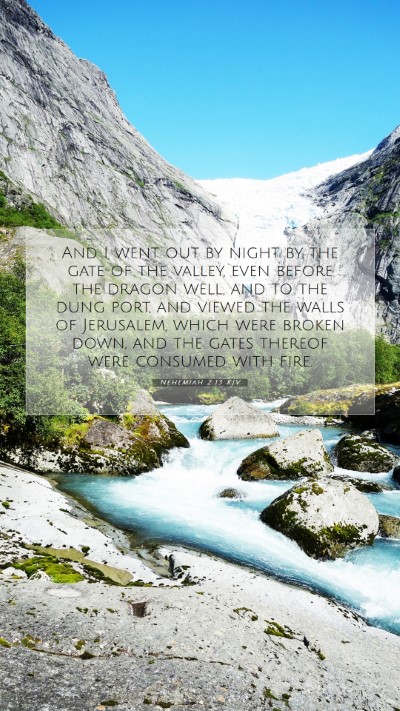Old Testament
Genesis Exodus Leviticus Numbers Deuteronomy Joshua Judges Ruth 1 Samuel 2 Samuel 1 Kings 2 Kings 1 Chronicles 2 Chronicles Ezra Nehemiah Esther Job Psalms Proverbs Ecclesiastes Song of Solomon Isaiah Jeremiah Lamentations Ezekiel Daniel Hosea Joel Amos Obadiah Jonah Micah Nahum Habakkuk Zephaniah Haggai Zechariah MalachiNehemiah 2:13 Meaning
What is the meaning of Nehemiah 2:13?
And I went out by night by the gate of the valley, even before the dragon well, and to the dung port, and viewed the walls of Jerusalem, which were broken down, and the gates thereof were consumed with fire.
Nehemiah 2:13 Bible Verse Meaning
Understanding Nehemiah 2:13
The verse Nehemiah 2:13 states:
"And I went out by night through the gate of the valley, even before the dragon well, and to the dung port, and viewed the walls of Jerusalem, which were broken down, and the gates thereof were consumed with fire." (Nehemiah 2:13 KJV)
Context and Background
Nehemiah, the cupbearer to the king of Persia, was deeply moved by the news of Jerusalem’s desolate state. After receiving permission from the king to return to his homeland, he set out on a journey to inspect the damage to the city walls and gates. This action signifies Nehemiah's commitment to restoring Jerusalem's glory and security.
Bible Verse Meanings and Interpretations
Several commentaries shed light on the significance of Nehemiah 2:13:
-
Matthew Henry:
Henry emphasizes Nehemiah's careful approach to assessing the condition of Jerusalem. He notes that by surveying the walls at night, Nehemiah exemplified wisdom and prudence, avoiding unnecessary attention and securing the safety of both himself and his mission.
-
Albert Barnes:
Barnes draws attention to the locations mentioned in the verse—the dragon well and the dung gate—which represent the distressing state of Jerusalem. His commentary indicates that these sites evoke the seriousness of the ruin and the urgency of Nehemiah’s task to restore them.
-
Adam Clarke:
Clarke discusses the symbolism of the wall as a representation of strength and protection. The destruction of the walls signifies not only a physical vulnerability but also a spiritual and national crisis that Nehemiah seeks to address through his leadership and determination.
Key Themes
This verse encapsulates several key themes that are important for biblical study:
-
The Importance of Leadership:
Nehemiah’s assessment of Jerusalem’s walls illustrates his proactive leadership. It encourages readers to understand the role of leaders in addressing problems promptly.
-
Restoration:
The act of observing the walls demonstrates a commitment to restoration, both physically and spiritually. This theme is foundational in understanding the larger narrative of Nehemiah's mission.
-
Historical Context:
Understanding the historical background of Jerusalem following the Babylonian exile is critical for interpreting this verse. Nehemiah's actions represent the hope and revival of a despairing community.
Application to Daily Life
Nehemiah 2:13 offers practical lessons for believers:
-
Self-Assessment:
Just as Nehemiah surveyed Jerusalem, individuals are encouraged to evaluate areas of their own lives in need of restoration, whether spiritual, relational, or physical.
-
Strategic Planning:
The importance of planning and assessing situations before taking action is a key lesson from Nehemiah’s approach, urging careful consideration in all endeavors.
-
Community Leadership:
The role of leaders in fostering change and attending to the needs of the community is highlighted, inspiring action among community-minded individuals.
Related Bible Cross References
- Nehemiah 1:3 - Heartbreaking news of Jerusalem's plight.
- Ezra 3:10 - The rebuilding of the temple.
- Proverbs 24:3-4 - The value of wisdom in building and establishing.
Conclusion
Nehemiah 2:13 serves as a powerful reminder of the need for observation, reflection, and restoration in both personal lives and broader communities. Through Nehemiah’s example, readers gain insight into effective leadership, the importance of planning, and the depth of commitment required to bring about change. By studying this verse, individuals can deepen their understanding of the themes of resilience and hope that run through Scripture.
Further Study and Resources
For those seeking to explore the Bible further, consider utilizing various Bible study tools and resources:
- Online Bible Study Groups: Join discussions to gain diverse perspectives on scripture.
- Bible Study Guides: Use structured materials for in-depth analysis and understanding.
- Bible Study Plans: Create a personalized plan to explore verses that resonate with personal experiences.


